Slovenia is tremendously rich in history. Although it is a small country, you’ll be pleasantly surprised at the amount of historic and cultural attractions in Slovenia that can wow travelers and holidaymakers. We have majestic castles with mysterious legends, beautiful churches, stunning medieval towns, iconic buildings, historic bridges, interesting and very informative museums and more.
| |
|---|
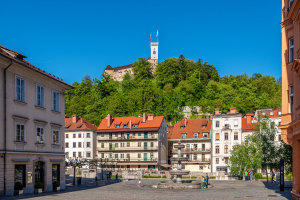 Overall Rating: Ljubljana is a charming little capital and its Old Town is one of Slovenia's top tourist destinations that draws over one million visitors per year. It's a mix of impressive architecture, a picturesque river littered with fascinating bridges, plus heaps of lovely restaurants, bars and cafés. It's a very safe and easy area to wander around - the streets are pedestrianized so that makes it quieter and more relaxed. |
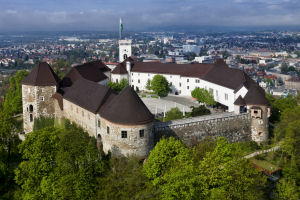 Overall Rating: Ljubljana Castle is the most prominent tourist attraction in Ljubljana, the capital of Slovenia. The castle is perched on top of a hill and can be seen from anywhere in Ljubljana, and you can see anywhere in Ljubljana from the castle. Majority of the castle is free to wander through and there is something for everyone (fantastic views, interesting exhibits, people in costume, lots to keep the children interested, good food, etc.). To visit the castle, you can walk up to it or you can take the funicular to the top. |
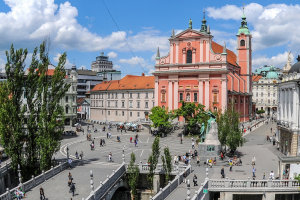 Overall Rating: Preseren Square is the center of Ljubljana’s Old Town, situated where the Triple Bridge crosses the Ljubljanica river and right in front of the pink Franciscan Church of the Annunciation. The square is cobblestone-paved and is an amazing place full of life, where both the locals and tourists hang out to socialize, listen to talented street musicians, people watch, and take in the views. |
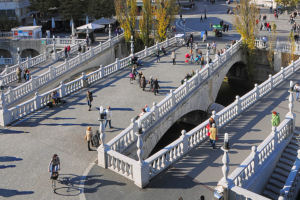 Overall Rating: Triple Bridge or Tromostovje as it is called in Slovene is located perfectly in the heart of Slovenia's capital Ljubljana. It connects the Ljubljana’s historic old town on one bank and the modern part of the city on the other. The bridge has a Venetian look to it – it was designed with a lot of Italian influence and looks like you would find it in Venice. It’s small yet lovely. There are usually buskers and other street entertainers on the bridge creating a lovely atmosphere. |
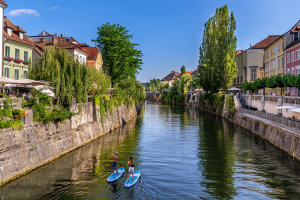 Overall Rating: The Ljubljanica river canal splits Ljubljana’s historic old town from the modern part of the city. A paved path exists along the entire way. The river’s banks are beautiful and you can spend an afternoon just wandering along and enjoy historic buildings and architecture, the many lively outdoor cafés and restaurants, and the vibe of the city. It's an excellent place to get a perspective on what living in Slovenia’s capital is all about. |
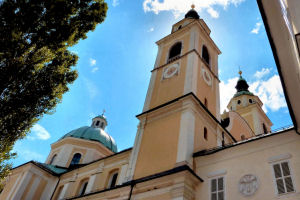 Overall Rating: Ljubljana Cathedral (also known as the Cathedral of St. Nicholas) is the main church in Slovenia's capital Ljubljana. It's not terribly impressive from the outside, but when you go inside it is magnificent. The amazing artwork adorns pretty much every inch of the inside of the building, with spectacular paintings (the cathedral has recently been refurbished so the colors are really vibrant), lots of gold leaf, intricate frescos on the ceiling and a magnificent pipe organ. |
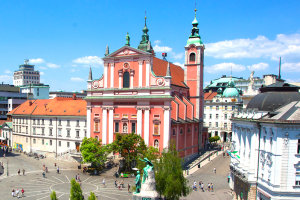 Overall Rating: The church is located in a prime position in the heart of the Ljubljana old town. You cannot fail to spot this salmon-pink church as it provides an attractive backdrop to the main Preseren Square at the end of the Triple bridge. The inside is worth a look for the painted ceiling and walls and the main altar, which was executed by a famous Italian sculptor Francesco Robba. |
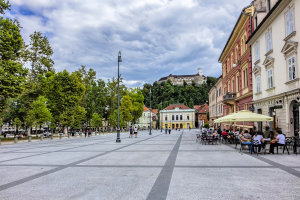 Overall Rating: Dating back to 1821, this large square in the centre of Ljubljana is surrounded by some of the city's most important and well known buildings and is a popular venue for large outdoor events. |
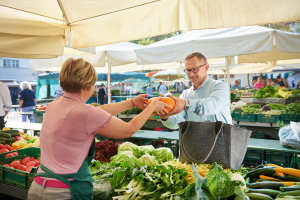 Overall Rating: Almost every visitor to Ljubljana will pass by Ljubljana Central Market as it's located in the historic city centre. The market is divided into outdoor and indoor areas. It's more than just a convenient place to buy food, it offers a perfect location to meet friends and people-watch and there’s a lot of pleasure to be had by just strolling around and seeing what's happening. |
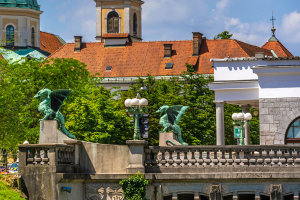 Overall Rating: The Dragon Bridge spans the Ljubljanica River at the eastern side of Ljubljana's historic city centre, On each of the four corners of the bridge sits a huge, almost real-looking dragon made from sheet copper. |
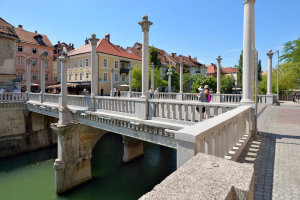 Overall Rating: The Cobblers' Bridge was built in 1931 by Joze Plecnik and encapsulates his style perhaps better than any other structure in Ljubljana: it's simple, with clean lines and adorned with classical columns. |
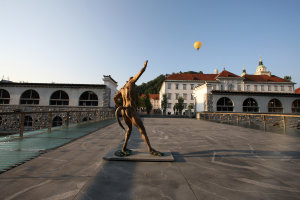 Overall Rating: The Butchers' Bridge spans the Ljubljanica River between the colonnaded Central Market and Petkovskovo Nabrezje Embankment in Ljubljana's Old Town. It features glass panels near the edges and some rather disturbing sculptures. Soon after the bridge opened in 2010, it also became home to the lovely tradition of couples affixing 'love locks' along the length of its steel wires. |
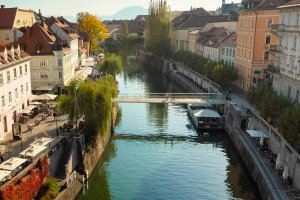 Overall Rating: The glassy Fishmarket Footbridge spans the Ljubljanica River in the midst of Ljubljana's Old Town. The bridge itself was designed to be as minimal and transparent as possible and isn't especially noteworthy, but it's a popular spot for strolls and offers a dazzling view of the iconic Triple Bridge and the salmon-pink Franciscan Church in one direction and the Cobblers’ Bridge in the other. |
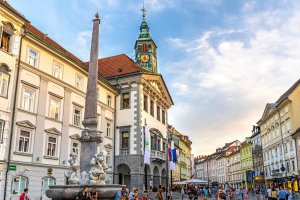 Overall Rating: Situated centrally within Ljubljana's Old Town, the historic Town Hall is a major landmark in Slovenia's capital and a key part of what is probably the most picturesque spot in the city. |
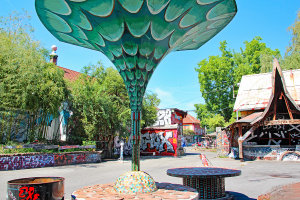 Overall Rating: Just across the Ljubljanica river from Ljubljana's historic city centre lie seven dilapidated buildings which are covered in graffiti and art. This is Metelkova – one the largest, and arguably most successful, urban squats in Europe. |
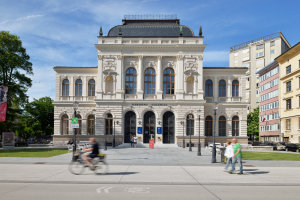 Overall Rating: Housed inside a beautiful neo-Renaissance palace, this wonderful gallery features the very best in Slovene art from the 13th century up to the first half of the 20th century, |
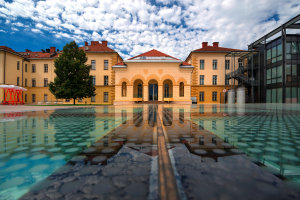 Overall Rating: The Slovene Ethnographic Museum is a wonderful museum in Ljubljana that takes you on a fascinating trip through Slovenian culture and history. |
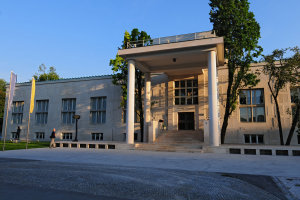 Overall Rating: The Museum Of Modern Art in Ljubljana focuses mainly on showcasing a diverse and exciting collection of Slovenian and international art dating from the 20th and 21st centuries. |
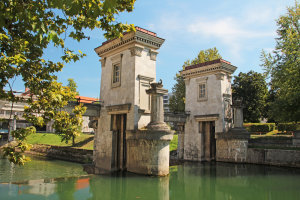 Overall Rating: Designed by Ljubljana's most revered architect Joze Plecnik in the 1930s, the Ljubljanica Sluice Gate marks the point at which the Ljubljanica river leaves Slovenia's capital Ljubljana. |
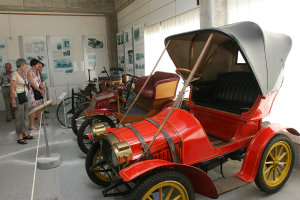 Overall Rating: The Technical Museum of Slovenia, with its extensive collections of technical heritage, is one of Slovenia’s most important and visited museums. It is housed in the 13th-century Bistra Castle. It might not be the easiest to get to, but for the technically minded this museum, 20 kilometres from Ljubljana in Bistra, is well worth the journey. |
| |
|---|
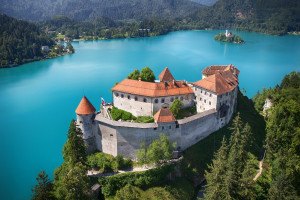 Overall Rating: Above the incredibly beautiful glacial Lake Bled, on a mighty steep cliff rising 130 meters high, is the iconic Bled Castle. It is one of the most visited Slovene sights with over 300.000 annual guests. |
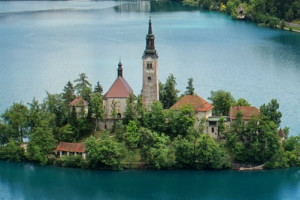 Overall Rating: Church of the Mother of God on the Lake, also known as the Pilgrimage Church of the Assumption of Mary, or The Church of Mary the Queen, or Our Lady of the Lake, is located on a a tiny, tear-shaped island in the middle of an incredibly beautiful Lake Bled. The church has such a beautiful setting that pictures of it are regularly found in travel magazines and on travel blogs and forums. |
| |
|---|
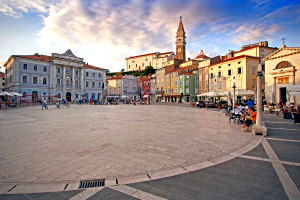 Overall Rating: The Tartini Square is a lovely square in the heart of the medieval walled Venetian town of Piran, the most famous town on Slovenia's 43-kilometre coast, which sits between Italy and Croatia. For a small town this is a wide open and quite large square. It's very Venetian in its white marble paving and surrounded by charming, Venetian buildings with wonderful architecture displayed. |
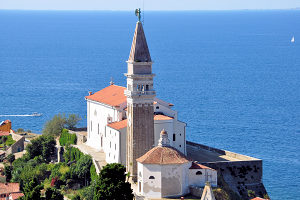 Overall Rating: The Church of St. George is the jewel on the crown of Piran. Originally built in the 12th century, its current structure dates from its expansion in the early 14th century, and its subsequent Baroque revamp in 1637. The church is beautifully decorated with frescos, marble altars and a large statue of St George slaying the dragon. |
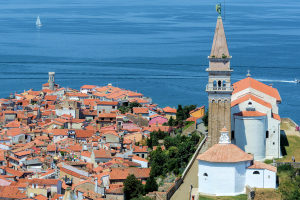 Overall Rating: In front of the Church of St. George, built separate from it in 1608, is the iconic 46,45 metre-high bell tower. There are 146 steps that lead to the top of the bell tower that houses four bells and is capped with a pyramidal spire. At the top of the tower sits a weather vane in the form of the 3,6-metre-tall Archangel Michael. |
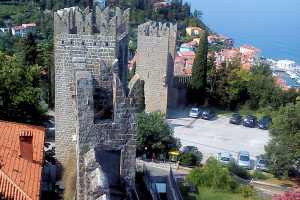 Overall Rating: Piran's Town Walls were built in various stages from the 7th to early 16th century and are one of the most famous attractions in the town. Originally the walls enclosed only the area west of the main Tartini square but between the years 1470 and 1534 expanded to include the entire peninsula. Sections of the wall and seven gates still stand throughout Piran, though the rest of it has been demolished. The walls themselves are great and quite impressive and you can climb to quite a height. The view however is the main reason to visit! |
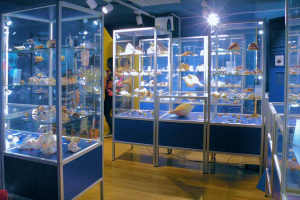 Overall Rating: The Piran Shell And Snail Museum with its permanent exhibition the Magical World of Shells is one of the best and most interesting museums in Slovenia. It features more than 4,000 specimens of rare and unique mollusks from all around the world. You'll see some of the most unusual clams, sea urchins, crabs, sea stars, and much more, varying in sizes and shapes. |
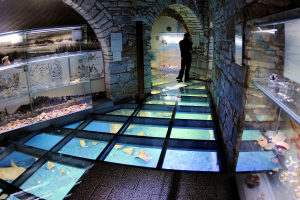 Overall Rating: Piran’s maritime history is exhibited at the superb Sergej Masera Maritime Museum. Named after a famous Slovenian sailor from Gorica, the museum offers information on Slovene naval history, the Adriatic Sea, sailing, fishing, salt-making and much more. The bulk of the museum collections is housed in the wonderful 19th-century Gabrielli Palace, right at the waterfront near Tartini Square in the historic centre of Piran, but quite a few of its collections are also presented elsewhere. |
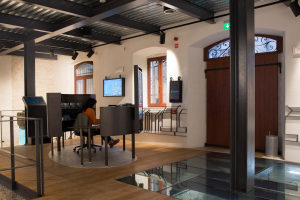 Overall Rating: If you are in Piran, try to take the time to visit this small, pleasant museum and make sure you attend the 3D movie to learn about the history of Piran. It will give you much more of an appreciation for this charming coastal town. |
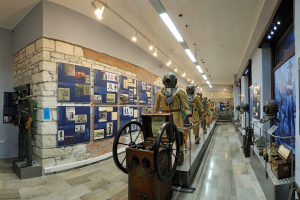 Overall Rating: The Museum of Underwater Activities Piran is a small but very interesting museum that gives an excellent overview of the history of diving in the Adriatic Sea, exhibiting old deep-sea diving suits and helmets. Besides the collection of antique diving equipment, the museum also has several models of submarines and the uniforms of their crews on display. |
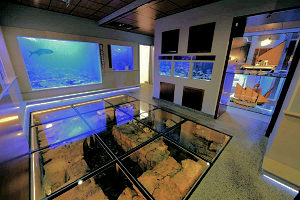 Overall Rating: The Piran Aquarium was founded in 1964 and is now the biggest aquarium in Slovenia with its collection of more than 120 species and 25 aquarium tanks. It showcases a good selection of fish and invertebrates living in the northern Adriatic Sea. |
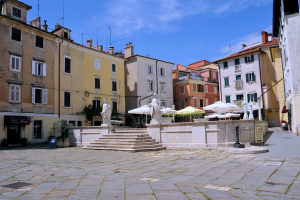 Overall Rating: The First of May Square, previously known as the Old Square, was the centre of Piran until the 13th century. It is surrounded by mainly baroque-inspired architecture as well as a few restaurants. art galleries and a great little wine bar. In the centre of the square, on a raised platform, there are a few eye-catching statues and a stone rainwater cistern which was built in the second half of the 18th century after the region suffered a severe drought. |
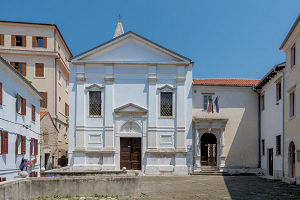 Overall Rating: The Church of St Francis Assisi dates back to the beginning of the 14th century, but has been enlarged and renovated over the centuries. The present interior dates back to the 17th century and the exterior is from the 19th century. Attached to the church is a Franciscan monastery with a splendid atrium, the cloister, which is considered by many as the most beautiful in Slovenia. In the monastery's basement there is a superb collection of paintings by various Venetian artists. |
| |
|---|
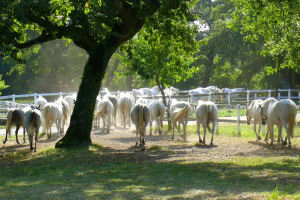 Overall Rating: The Lipica Stud Farm is one of the most important and one of the most beautiful cultural and historical monuments in Slovenia, with the history reaching back to the year of 1580. It’s recognized as the oldest European stud farm continuously breeding one of the oldest cultural horse breeds, the famous Lipizzaner (a.k.a. Lipizzan) horse. These magnificent creatures are characterised by a perfect and noble physique, the ability to learn, graceful movements, liveliness, and good nature. |
| |
|---|
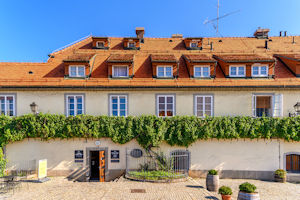 Overall Rating: Discover Maribor's famous 450-year-old vine and Slovenia's wine culture at the Old Vine House. Taste delicious local wines from their great selection, and check out the beautiful new mosaic floor that shows Maribor's history. |
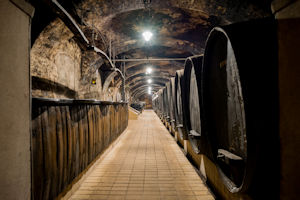 Overall Rating: Established in 1847, the Vinag Wine Cellar is one of Europe's largest and oldest classical tunnel wine cellars right in Maribor's city center. It stretches over 2 km underground, covers more than 15,000 m², and boasts a storage capacity of up to 3 million liters, featuring endless rows of enormous wooden barrels, historic concrete tanks, and a treasured archive of rare vintages dating back to 1946. |
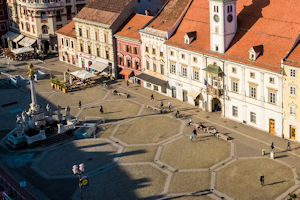 Overall Rating: Main Square in Maribor is a pedestrian-friendly square that's ideal for leisurely walks among colorful historic buildings, admiring the striking Plague Column at the center, relaxing at outdoor cafés, people-watching, or enjoying occasional farmers' markets and events—all with a charming, lively atmosphere free from cars. |
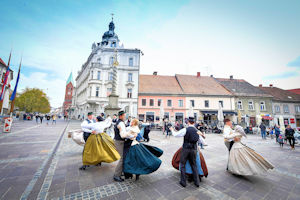 Overall Rating: Castle Square in Maribor is a pretty historic square next to Maribor Castle in the old town. It comes alive all year with fun events like open-air concerts, markets, cultural festivals, holiday celebrations, and small performances. |
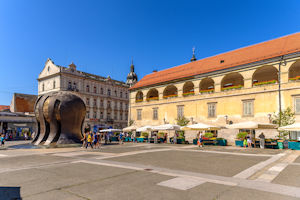 Overall Rating: Freedom Square in Maribor is a popular, car-free spot where locals meet, have coffee, enjoy markets or events. It's close to the old town, easy to visit and full of history and everyday city life. |
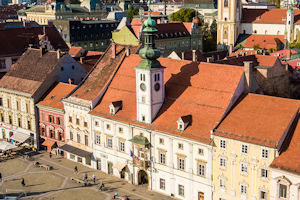 Overall Rating: Rotovz is not a big museum-style attraction, but its charm, historical significance, and prime location make it a worthwhile, easy stop—highly recommended for anyone exploring Maribor! |
| |
|---|
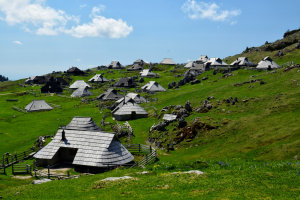 Overall Rating: Velika Planina is a high-elevation Alpine settlement of 63 traditional herdsmen's huts located at an elevation between 1,500 and 1,666 metres in the heart of the Kamnik-Savinja Alps in northern Slovenia. The huts are scattered all around the plateau, with pine shingle roofs and an architecture that is unique only to this mountain land. |
| |
|---|
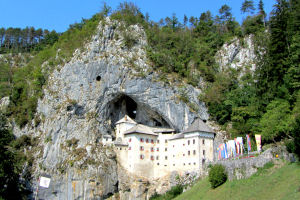 Overall Rating: The Predjama Castle is a beautiful renaissance castle built in the mouth of a cave in the idyllic village of Predjama in the Karst region of Slovenia. It was constructed in the Gothic style in the 13th century and is considered to be one of the more significant architectural masterpieces of that time. To prevent easy access, the castle was built under a natural rocky arch high in the stone wall. |
| |
|---|
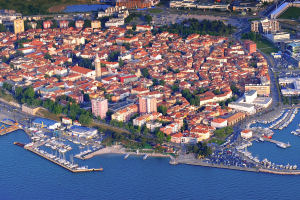 Overall Rating: The main attraction in the seaside town of Koper is its well-preserved medieval city center called the Old Town. Five centuries of Venetian rule are almost impossible to ignore here, especially while strolling along the narrow streets past impressive old buildings and former palaces. |
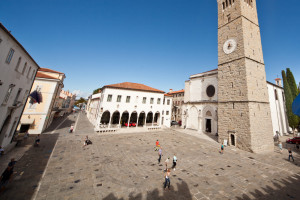 Overall Rating: This quite sizeable town square is the first place you should head when exploring Koper. It dates back to the Venetian era and is home to several of the town's main attractions. |
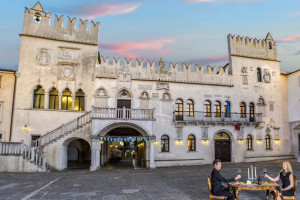 Overall Rating: For any visitor to Koper, the Praetorian Palace is a must see. It is located in the centre of the town on the main Tito Square and absolutely dominates the place. |
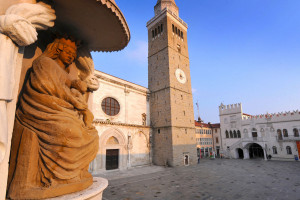 Overall Rating: Koper's cathedral is located right in the historic city centre on the main Tito square and dates back to the second half of the 12th century when Koper acquired its own diocese. |
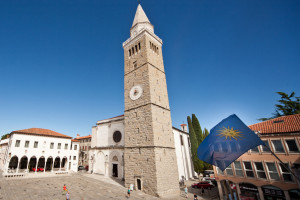 Overall Rating: Set on the eastern side of the Tito square in the centre of old Koper is the 54-metre-high Bell Tower. If the weather is good, amazing panoramic views of the entire Koper area and beyond can be had by climbing 204 steps to reach the viewing platform at 43 meters. |
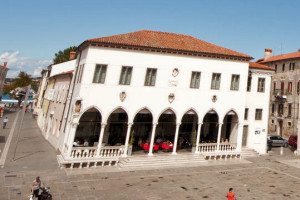 Overall Rating: With its impressive Gothic-style lancet arches, the 15th-century Loggia building stands on the northern side of the historic Tito Square in the heart of old Koper. Its ground-floor arcade is now a café. A side door leads to the first-floor Loza gallery. |
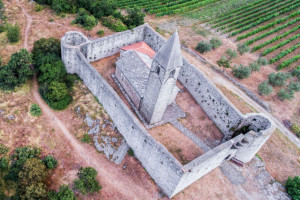 Overall Rating: The rustic village of Hrastovlje, located in the hills above the coast, only a short 20-minute drive from Slovenia's largest coastal town Koper, is home to one of the country's most outstanding medieval treasures, the Church of the Holy Trinity. The church building itself is quite impressive, looking like a small, ancient fort, but what attracts most visitors to this little church is the famous Dance of Death fresco on the south wall. |
| |
|---|
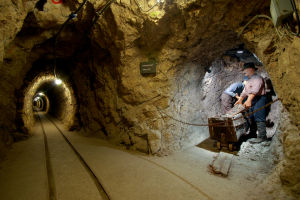 Overall Rating: The history of mining in Idrija dates back to 1490. Until the First World War Idrija's Mercury Mine was one of the best technically equipped mines in Europe. In 1986 the decision was made to close the mine. Today, visitors can tour a portion of the closed mine, called Anthony's Shaft, and learn about the difficult conditions endured by the mercury miners from the end of the 15th century till the end of the 20th century. |
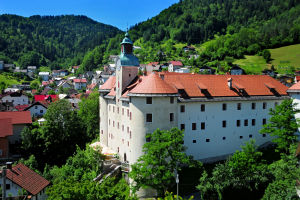 Overall Rating: The Gewerkenegg Castle stands atop a small hill on the western edge of the small mining town of Idrija in western Slovenia. It was built between 1522 and 1533 to serve as the administrative headquarters of Idrija's mercury mine. Today, the castle houses the award-winning Idrija Municipal Museum featuring the excellent collections which deal with mercury, lace and Idrija's history.. |
 Overall Rating: One of the most interesting examples of mining technology that still exists in Idrija is the Kamst, an impressive waterwheel made of wood in 1790 to pump the water out of flooded mineshafts below. With a diameter of 13,6 meters, it is the largest preserved wooden waterwheel in Europe. It operated uninterrupted for 158 years until 1948. It stands on its original location in a stone building on the western outskirts of town. |
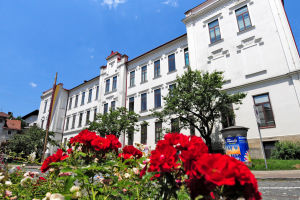 Overall Rating: The Idrija Lace School is a recognized and valued institution among professional circles in Europe. It offers quality education for students and adults in lace-making, maintains and develops this rich treasury of knowledge, and consequently enhances the quality of the lace produced in Idrija. In the school, there's a showroom where visitors can see the remarkable pieces made by students of the school. There's also a small shop with items for purchase. |
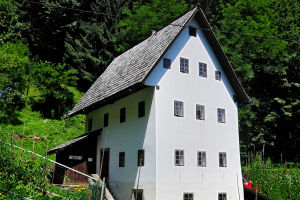 Overall Rating: The history of Idrija's days as a mining town is apparent in the numerous sights in the town and its surroundings. One such very interesting sight to visit, representing the former way of life of miners' families, is the 18th-century Miner's House, or Rudarska Hisa as it is called in Slovene. It stands in the Bazoviska street on a slope facing the town below, not far from Idrija's town centre. |
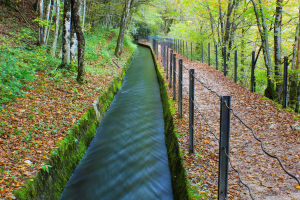 Overall Rating: The Rake water channel in Idrija was built at the end of the 16th century to support the mercury mine operations. Initially, the water channel was wooden, but in the second half of the 18th century it was enclosed with stone. Along the water channel, there's a two-and-a-half-kilometre-long nature learning path unveiling Idrija's treasures of geology, flora and cultural history.. |
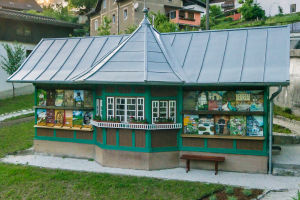 The Idrija Municipal Apiary stands behind the Church of the Holy Trinity, only a short walk from the center of Idrija. This highly crafted and extremely well executed and painted apiary is one of the most important structures of Slovene beekeeping. It was built in 1925 and completely renovated in 2013. |
| |
|---|
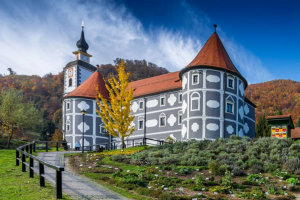 Overall Rating: The Olimje Monastery is located in the hamlet of Olimje, just southwest of the spa village of Podcetrtek. It consists of a southeast and southwest wing with oval towers in the corners. Besides the impressive external appearance of the building, the key attractions are the incredible golden altar from 1675 and a very interesting pharmacy which dates back to the 17th century and still produces medicines via natural sources. |
| |
|---|
 Ljubljana Old Town is the historic old centre of Ljubljana, the capital city of Slovenia. It is the most attractive and picturesque part of Ljubljana with all the most important tourist attractions like the Triple Bridge, Preseren Square, Ljubljanica River Canal, Ljubljana Cathedral, Franciscan Church, and many others. |
 Ljubljana is Slovenia’s capital and largest city. Within it, Ljubljana Old Town is the historic centre of the city where you’ll find cobblestone streets, charming bridges, pretty alleyways, open-air markets, and numerous outdoor cafes and restaurants. |
 Ljubljana’s Old Town is the most popular tourist destination in Slovenia's capital that draws over a million visitors per year. It is located on the right (eastern) bank of the Ljubljanica River and at the foot of the Castle Hill. It is filled with history, culture, and fantastic restaurants and bars. |
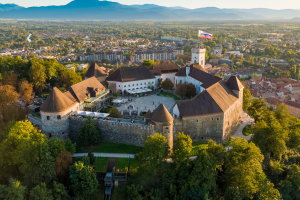 Built in the 15th century, the Ljubljana Castle stands on top of a 375-metre-high hill above the historic old centre of Ljubljana, the capital of Slovenia. It is Ljubljana's main tourist attraction where various cultural, historic and entertaining events take place regularly throughout the year. |
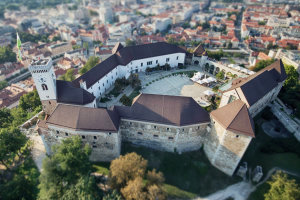 Ljubljana Castle is a medieval fortress dominating Slovenia's capital skyline to the south for the last 600 years. It is visible from any and all spots in the city centre. |
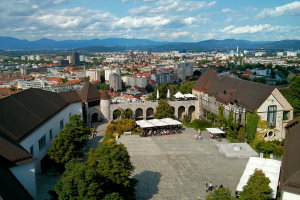 Ljubljana Castle is probably the main must see attraction in Slovenia's capital Ljubljana. Because of its position, it is usually the first thing to photograph for those visiting Slovenia's capital Ljubljana. |
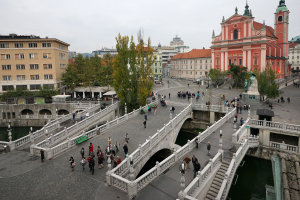 The Triple Bridge is a group of three separate bridges within a few meters of each other, crossing the Ljubljanica river right in the heart of Slovenia’s capital Ljubljana. |
 As the name suggests, Triple Bridge is a collection of three bridges across the Ljubljanica River. It’s the most famous of bridges in Slovenia's capital Ljubljana, thanks to its distinctive design, connecting Ljubljana's Old Town with the modern part of the city. |
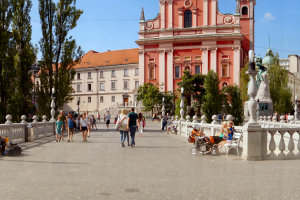 The Triple Bridge is one of Ljubljana’s major tourist attractions. It is a unique combination of a 19th-century road bridge and two 1930s pedestrian bridges designed by the most famous Slovenian architect Joze Plecnik. |
 Ljubljana Cathedral, or the Cathedral of St. Nicholas as it is also known, is the main church in Ljubljana, the capital Of Slovenia. |
 Ljubljana Cathedral isn't very impressive from the outside, but the interior is absolutely breathtaking. |
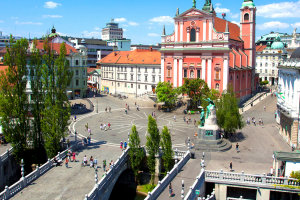 The Preseren Square is the main square in Ljubljana, the capital of Slovenia. It is located in the pedestrian zone in the historic old centre of the city where festivals, concerts, and various other events take place throughout the year. |
 Preseren Square is part of Ljubljana's Old Town. It's an ideal spot to snap a selfie and people-watch. In the festive season, the square is decked out in an array of Christmas lights. |
 Preseren Square is named after the greatest Slovenian poet, Dr. France Preseren. Always bustling with activity, this square is exceptionally pedestrian-friendly and has become a popular meeting spot for both locals and tourists. |
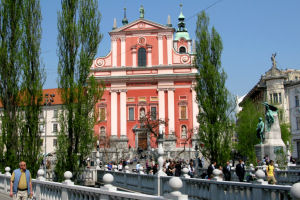 With its attractive salmon-pink facade, the Franciscan Church of the Annunciation in Ljubljana is one of the most recognizable buildings in the capital of Slovenia. It stands on the main Preseren Square in the historic old centre of the city. |
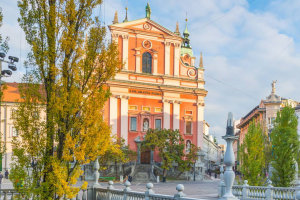 The 17th-century salmon-pink Franciscan Church of the Annunciation stands on the Preseren Square in the heart of Ljubljana's Old Town. The pink facade of the Franciscan Church is very striking and unusual, and is probably the most famous image of Slovenia's capital Ljubljana. |
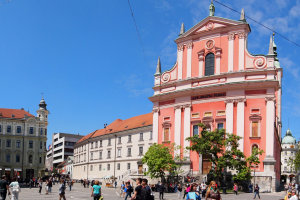 Built in the 17th-century, the salmon-pink Franciscan Church of the Annunciation dominates the Preseren Square in the heart of Ljubljana's Old Town. The church is part of a larger complex that includes the adjoining Franciscan Monastery. |
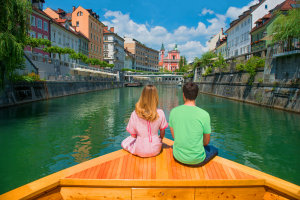 The Ljubljanica River Canal is the most attractive and picturesque part of Ljubljana, the capital of Slovenia. The canal is lined with beautiful historic buildings as well as al fresco cafes, restaurants and small shops. |
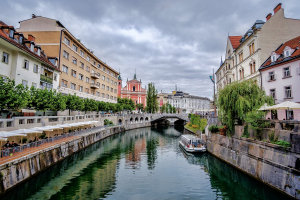 The Ljubljanica river, with its wonderful bridges and very picturesque embankments, is one of the most notable landmarks in Slovenia's capital Ljubljana. |
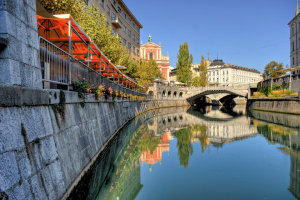 The heart of the social life in Slovenia's capital Ljubljana are the Ljubljanica river embankments, densely scattered with lively cafés and bars offering outdoor seating. |
 Situated in the centre of Ljubljana, the Congress Square is one of the largest squares in Slovenia's capital. |
 Ljubljana Central Market was designed by revered twentieth-century Slovenian architect Joze Plecnik between the years 1931 and 1939. |
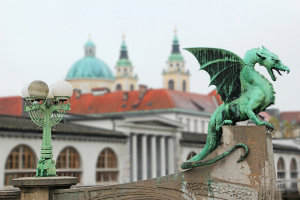 The Dragon Bridge is an iconic landmark in Ljubljana, and a wonderful place to photograph. |
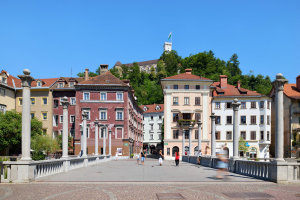 Designed by Joze Plecnik, the Cobblers’ Bridge is very elegant and features balustrades with pillars topped with either stone balls or lamps that are turned on during the night. |
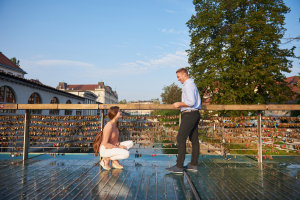 The Butchers' Bridge is Ljubljana's love bridge, where numerous couples have symbolically padlocked their love and dropped the key into the Ljubljanica river which flows under the bridge. |
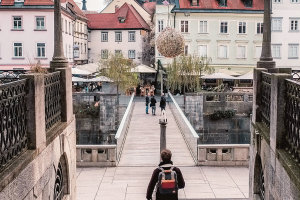 Built in 2014, the glassy Fishmarket Footbridge was designed to be as minimal and transparent as possible. |
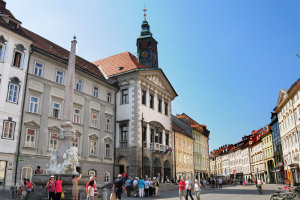 One of major landmarks in Slovenia's capital Ljubljana and sometimes referred to as the Magistrat or Rotovz, the Town Hall was built in a Gothic style in 1484 and underwent a Baroque renovation between 1717 and 1719. |
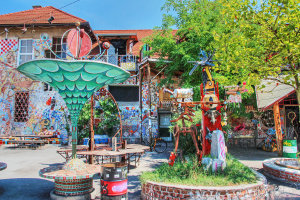 The one-of-a-kind Metelkova lies in the heart of Slovenia's capital Ljubljana. It's an autonomous social and cultural centre, an alternative city within a city, very similar to Christiania in Denmark, just a little smaller. |
 Situated in the centre of Ljubljana, the National Gallery Of Slovenia is an art museum with one of the longest traditions in the country. |
 Bled Castle is the oldest castle in Slovenia, first mentioned in the year 1011. The castle is one of the most visited tourist attractions in the country. |
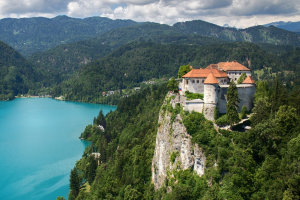 Boasting a perfect picture-postcard setting atop a 130 meter high cliff above the north shore of Lake Bled, Bled Castle is one of the most-photographed castles in the world with many landscape photographers choosing to capture it from all angles, and in all seasons and times of the day. |
 Sitting atop a steep cliff rising 130 meters above Lake Bled, Bled Castle is the oldest castle in Slovenia and the symbol of the country. Because of its position, it is usually the first thing to photograph for those visiting the town of Bled. |
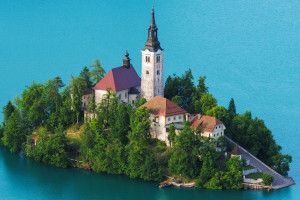 Bled Island is a small tear-shaped isle in the middle of Lake Bled and the most famous building on it is the Church of the Mother of God on the Lake, a Gothic church with a 52-meter tower. |
 The Church of the Mother of God on the Lake is located on a tiny island in the middle of Lake Bled. It has such a remarkable setting that photographs of it are regularly found in travel magazines. |
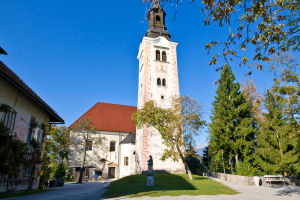 The Church of the Mother of God on the Lake is the iconic church on the Bled Island that you see from pretty much everywhere as you walk around the lake. |
 This beautiful renaissance Predjama Castle was constructed in the Gothic style in the 13th century and is considered to be one of the more significant architectural masterpieces of that time. To prevent easy access, the castle was built in the mouth of a cave under a natural rocky arch high in the stone wall. |
 The Lipica Stud Farm is one of the most important and one of the most beautiful cultural and historical monuments in Slovenia, with the history reaching back to the year of 1580. It’s recognized as the oldest European stud farm continuously breeding one of the oldest cultural horse breeds, the famous Lipizzaner (a.k.a. Lipizzan) horse. |
 The lovely Tartini Square lies in the heart of the medieval walled Venetian town of Piran, the most famous town on Slovenia's 43-kilometre coast. For a small town this is a wide open and quite large square. It's very Venetian in its white marble paving and surrounded by charming, Venetian buildings with wonderful architecture displayed. |
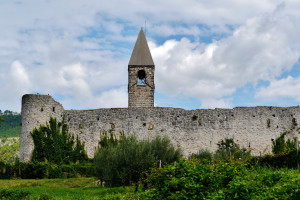 Hrastovlje, a rustic small Istrian village not far from the largest town on Slovenia's Adriatic coast, Koper, is home to one of Slovenia's most stunning medieval treasures, the 12th-century Church of the Holy Trinity, a simple Romanesque structure sheltered behind a high defensive wall. |

Such a beautiful country . We went there for first holiday when we came to live in Holland. Have been again with our campervan.
I would love to go to Slovenia and see the beautiful country my dad grew up in and meet my relatives in person!